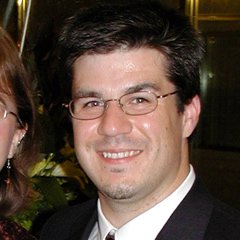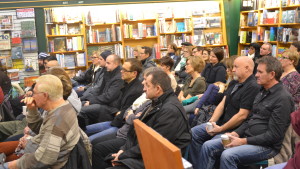A guest post by Dylan Blacquiere
When I was younger, I dreamed of being a professional author. I dreamed, like many I knew, of seeing my name on placards in the book store announcing my latest signing, of getting invitations to the book talk programs on public radio, of being the next Robertson Davies or Mordecai Richler. An Important Author. The thought comforted me through some difficult times, and for a great part of my life, I thought of my studies and my career as the prelude to my Great Discovery. And I did write; I won some writing contests and managed to enter, and complete, the three-Day Novel Contest twice. A good start.
But there came a time when day-to-day life intruded, as it always does, and writing became just one of the many things that I needed to accomplish in any given day. My wife, who has similar aspirations of making a career as a writer, dealt with this by diving headlong into the Business – she set aside writing time each day, found contests to enter, and ultimately has found some success by getting some publications in anthologies. She knows that this will be her main career, and that with enough success and good fortune, she will be able to make a career as a professional author.
My greatest gift, however, is in learning that my path is different.
I’m struck by how many people start out with dreams like mine and who, like me, find that life gets in the way. It can be an excuse, of course. If the dream is strong enough, then one will find the time and the will to press forward. But sometimes there are extenuating circumstances. Sometimes you realize that a dream is not enough to carry you forward. In my case, I don’t want my writing to be my primary focus. I am also a stroke neurologist, and that demands time and attention if I want to be excellent at that role. Soon I will be dealing with all sorts of responsibilities and duties at work that are as important to me and to my aspirations as the name on the placard ever was. Other people face similar dilemmas, and others fall into the worst of both worlds – they neglect the one in favour of the other, and they end up tainting both. The pursuit of writing as a business takes discipline and focus and time, but so do the other things.
When I realized this, that being truly excellent at either of these goals would require a level of devotion that would harm the other, I knew that I had to make a choice, and I chose medicine. It meant that I had to give up the straightforward path to the dream I had when I was younger, and that I likely won’t be able to devote the time and the focus in the same manner as my wife does; nor will I see the rewards that seemed worth anything. There is a certain grief for that, and I can’t entirely shake the feeling that I’m justifying giving up in some fashion.
However, the more that I think about it, the more that realization seems like the greatest gift that I have received as a writer. Not everyone gets to be top of the charts, after all, and not every creative outlet needs to be in service of a career. Knowing my limits has freed my work to be more personally satisfying; when I do write, I can write knowing that it isn’t carrying my livelihood on its shoulders. I can explore other outlets for my creativity that fall outside of the traditional publishing model. There is a growing field of narrative medicine, studying how the way we tell stories leads to better health care, and I have started to explore this in earnest as part of my work in neurology. As well, health care needs good writing too; being able to write clearly and coherently about how medicine works makes me an ideal person to write things like blogs or newspaper columns that help people navigate the health care world that I know so well. And of course, there is always something to be said about writing for writing’s sake; the gift of just putting words on paper, even if for no one else than one’s self, is sometimes hard to remember when we talk about things like sales margins and promotional materials.
I’ve realized that I, personally, have to let some of those old dreams go. But that’s left me free to find other ways that writing can be a part of my professional and personal lives. I don’t mean to suggest that everyone needs to be a hardcore realist about it; for some people, taking the chance on becoming a professional author is the only way for them to be true to themselves. But for the rest of us, the realization that there are other paths, that the creative urge doesn’t have to lead down only the one road – what else can that lead to but self-awareness and contentment? It can be a gift to learn where your limits are, and it can bring with it another gift – learning where other roads can take you. I’m glad that I learned those lessons when I did. They aren’t for everyone, but for some of us, they are precious beyond compare.
 Dylan Blacquiere Bio:
Dylan Blacquiere Bio:Dylan Blacquiere is a fellow in stroke neurology at the University of Ottawa, soon to be a full-time stroke neurologist in New Brunswick. He has worked on research projects involving writing, metaphor and medicine, including an examination of how people who have survived cancer treatment use metaphor in telling their stories. He has published short stories in “In Our Hands”, an anthology of medical writing, writes a monthly newspaper column on life in medicine for The


 On the evening of November 7, a small group of readers gathered at my parents’ home to hear the first reading from my new book, The City of Darkness. This was the pre-launch, and it was reserved not for close friends but rather the people who had responded the strongest to the first novel in my ongoing series, which had been released two years earlier. (An unconscionably long gab between books, by the way, but that’s a subject for a different post.)
On the evening of November 7, a small group of readers gathered at my parents’ home to hear the first reading from my new book, The City of Darkness. This was the pre-launch, and it was reserved not for close friends but rather the people who had responded the strongest to the first novel in my ongoing series, which had been released two years earlier. (An unconscionably long gab between books, by the way, but that’s a subject for a different post.)